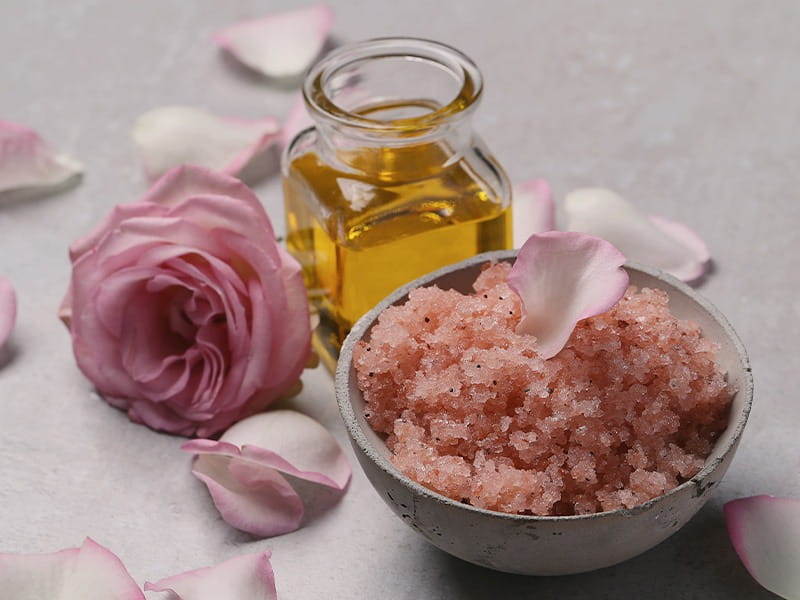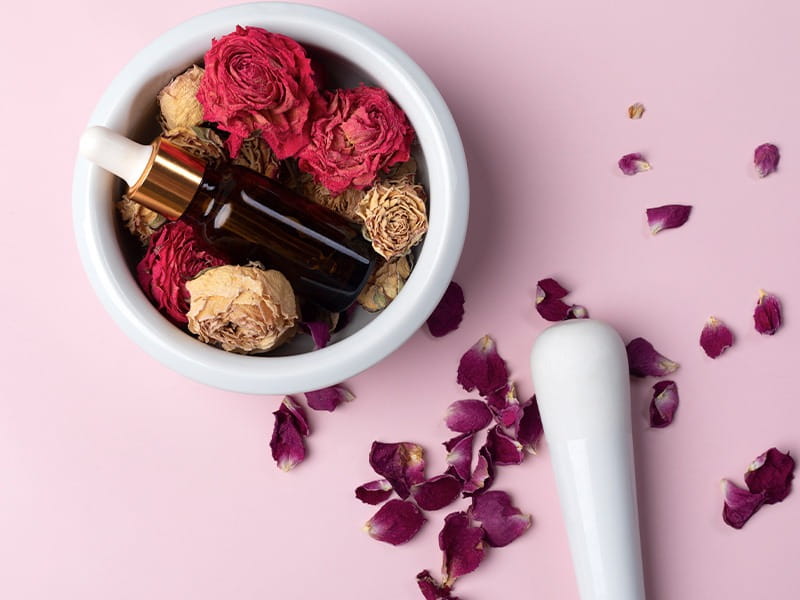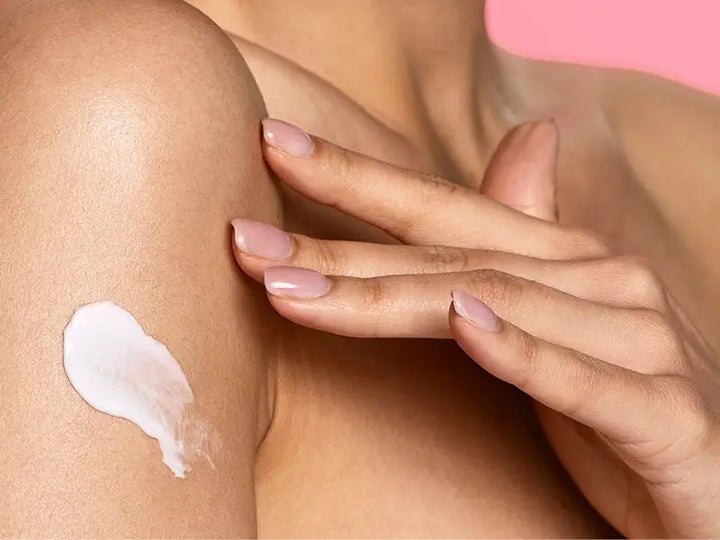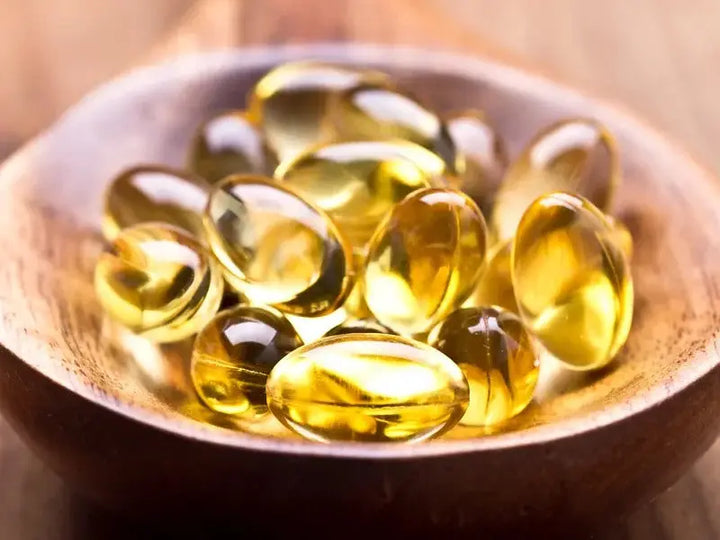One ancient remedy has transcended time in the quest for radiant skin – rose essential oil. The petals of the quintessential flower of love have more than just a romantic role; they are a skincare elixir. This fragrant rose oil has been treasured since antiquity, not just for its intoxicating scent but also for its healing properties.
Rose essential oil has a rich history, from Persia's royal gardens to the Renaissance apothecaries. To extract just one ounce of this coveted oil, thousands of delicate rose petals are meticulously distilled, capturing their essence. This process is both an art and a science, yielding a product brimming with antibacterial and antifungal properties that can soothe, refresh, and restore the skin.
This article will explore how rose essential oil can combat depressive symptoms, reduce anxiety and stress, provide pain relief, and offer solace from menstrual discomfort. Yet, with potent botanicals, there's a thin line between remedy and irritant, so we'll also delve into potential side effects and safety tips. Furthermore, we'll demystify the differences between rose oil and rosehip seed oil, guiding you through the most effective ways to harness rose essential oil for your skincare routine.
Historical Uses of Rose Oil in Skincare
Rose essential oil, treasured for centuries, has been a cornerstone in beauty rituals and traditional medicine, echoing the practices of historical icons like Cleopatra, who adored its skin-preserving qualities. Enshrined in the annals of the cosmetic world since its surge in 16th-century Europe, this precious elixir cemented itself as a luxury staple. The zenith of its use was witnessed in the 1800s, with the oil becoming a signature ingredient in perfumery and skincare products.
Today, the timeless allure of rose essential oil continues to captivate those seeking natural elegance and age-defying remedies embedded in the legacy of flourishing rose plants.

How is Rose Essential Oil produced?
Extracting rose essential oil is a delicate and labour-intensive task often undertaken in the early morning hours when the blooms of the rose plant contain the highest concentration of aromatic compounds. The two most common methods are steam distillation and solvent extraction.
The steam distillation is conducted by placing the rose petals in a still and then passing steam through them. The steam helps to release the aromatic molecules from the petals, which are then condensed and collected as rose essential oil. This method is considered the most traditional and produces a high-quality oil.
On the other hand, solvent extraction involves immersing the rose petals in a solvent, such as hexane or ethanol, which helps to dissolve the essential oil. After the mixture is filtered, the solvent is evaporated, leaving behind the concentrated oil. This method is commonly used when working with delicate or fragile flowers that may not withstand the heat of steam distillation.
Regardless of the extraction method, pure rose essential oil is highly concentrated and should be used sparingly. A little goes a long way when reaping the benefits for your skin.
Top Benefits of Rose Oil for Skin Health
Anti-inflammatory Properties
Rose essential oil boasts powerful anti-inflammatory properties, making it an excellent choice for soothing irritated skin. It can relieve common skin conditions such as acne, rosacea, and eczema. The oil helps to reduce redness and inflammation, promoting a more even and toned complexion.
Hydrating and Moisturizing
Rose oil is a natural emollient that helps lock in moisture and hydrate the skin. It's especially beneficial for dry and dehydrated skin types. The oil penetrates deep into the skin, nourishing and softening it from within. Regularly using rose oil can help improve the skin's overall texture and appearance, leaving it smoother, plumper, and more radiant.
Anti-aging Properties
One of the most well-known benefits of rose oil is its anti-ageing properties. It is packed with antioxidants that combat free radicals, which are known to accelerate the ageing process. The oil helps to protect the skin from environmental damage, reduces the appearance of fine lines and wrinkles, and promotes a youthful complexion. Regular use of rose oil can help to improve skin elasticity, firmness, and overall vitality.
Antibacterial Properties
Rose oil also possesses antibacterial properties, making it effective in preventing and treating acne for acne-prone skin. It helps to inhibit the growth of acne-causing bacteria, reducing breakouts and promoting clearer skin. The oil's antibacterial properties also make it helpful in treating other concerns, such as infections and wounds.
Soothing and Calming
The scent of rose essential oil is known to have a calming effect on the mind and body. When applied to the skin, it can help reduce stress and anxiety, often manifest as skin redness and irritation. The soothing properties of rose oil can help to relieve tension and promote a sense of relaxation, which in turn benefits the health and appearance of your skin.
Improves Blood Circulation
Using rose oil on your skin can help to improve blood circulation. Proper blood flow is essential for delivering oxygen and nutrients to the skin cells, promoting healthy cell turnover and regeneration. Improved blood circulation can also give your skin a natural and healthy glow.
Balances Oil Production
Contrary to popular belief, rose oil helps to balance oil production in the skin. It can regulate sebum production, making it suitable for both oily and dry skin types.
For those with oily skin, rose oil can help to control excessive oiliness and reduce the appearance of shine. On the other hand, for those with dry skin, rose oil can provide much-needed hydration and nourishment, preventing the skin from becoming too dry or flaky.
Reduces Inflammation and Irritation
Rose oil has anti-inflammatory properties that help calm and soothe inflamed or irritated skin. It can help to reduce redness, swelling, and itching associated with conditions like rosacea, eczema, and dermatitis. Applying rose oil to the affected areas can provide relief and promote healing.
Brightening and Toning
Rose oil is also known for its brightening and toning effects on the skin. It contains natural compounds that can help to even out skin tone and fade dark spots and hyperpigmentation. The oil can also help to tighten the skin, reducing the appearance of pores and giving the skin a more youthful and radiant glow. Regular use of rose oil can help to improve the overall clarity and brightness of the skin, resulting in a more even and glowing complexion.
Soothing and Calming
In addition to its anti-inflammatory properties, rose oil is known for its soothing and calming effects on the skin. Its delicate and pleasant aroma can help to relax the mind and reduce stress, which can positively impact the skin's health. When applied topically, rose oil can help calm irritated skin, reduce redness and inflammation, and relieve conditions such as sunburns and rashes.
Clearing and Balancing
Rose oil also has a natural astringent property, making it an excellent choice for those with oily or combination skin. It helps to regulate the production of sebum, the skin's natural oil, and prevent clogged pores and breakouts. By clearing excess oil and impurities, rose oil helps to balance the skin and promote a more refined and clear complexion.
Calming Sensitivity
For those with sensitive skin, rose oil can be a game-changer. Its gentle nature and anti-inflammatory properties make it suitable for soothing and calming sensitive and easily irritated skin. It can help to reduce redness, itchiness, and discomfort, providing relief and comfort to sensitive skin types.
Enhancing Skin Regeneration
Rose oil contains essential nutrients that promote skin regeneration and renewal. It helps to stimulate the production of collagen and improve the skin's elasticity, making it more resilient and youthful-looking. By enhancing the skin's natural healing process, rose oil can fade scars and blemishes, resulting in a smoother and more even skin tone.

Potential Side Effects and Precautions when Using Rose Oil
Rose essential oil is generally considered safe for most people when used appropriately. However, like with all essential oils, there can be some side effects, especially if misused or by individuals with specific sensitivities. Here’s a list of potential side effects to be aware of:
Skin irritation or allergic reactions can occur, especially in sensitive skin patients. Patch testing is recommended before widespread use.
Overuse of undiluted oil may lead to headaches or nausea due to its strong scent.
Pregnant or nursing women should consult a healthcare provider before use as the effects are not well-studied in these populations.
In summary, while side effects are not common, they are possible, and users should exercise caution with rose essential oil.
Safety Tips for Using Rose Oil on Skin
When incorporating the essence of the rose plant into your routine, it’s crucial to adhere to safety guidelines to prevent undesirable effects, especially for those with dry skin or sensitivities. Here are essential safety tips for using rose oil:
Dilution: Always dilute rose oil with a carrier oil to minimise the risk of skin irritation. A typical ratio is 1 to 2 drops of rose oil to a tablespoon of carrier oil.
Patch Test: Before completing the application, conduct a patch test. Apply a small amount of diluted rose oil to your inner forearm and wait at least 24 hours to observe any adverse reactions.
Quantity: Use rose oil sparingly. A few drops are usually sufficient for the intended skin benefits. Less is more to avoid overwhelming your senses or skin.
Storage: Keep rose oil in a cool, dark place to preserve its integrity and potency.
Incorporating these measures ensures your experience with rose oil is as safe as it is rejuvenating for your skin.
What is the difference between rose oil and rosehip seed oil?
Rose oil and rosehip seed oil, derived from the rose plant family members, serve distinct purposes in skincare due to their unique properties.
Rose oil is extracted from the petals of various species of rose, predominantly via steam distillation or solvent extraction. It's rich in essential oils and is renowned for its fragrant aroma. This oil is primarily used for its scent and is believed to have therapeutic properties that can help soothe the mind and improve emotional well-being.
In contrast, rosehip oil is pressed from the seeds and fruit of the rose plant, typically the Rosa canina or Rosa rubiginosa species. Unlike rose oil, rosehip seed oil is packed with vitamins, antioxidants, and essential fatty acids. It is celebrated for hydrating dry skin, reducing scars and fine lines, and promoting skin regeneration.
Understanding these differences is crucial for selecting the right oil for your skincare needs. Rose oil elevates the sensory experience, while rosehip seed oil targets skin health and rejuvenation.
How To Use Rose Essential Oil For The Skin?
Treasured for its enchanting fragrance, Rose essential oil can also be a luxurious addition to your skincare routine. Here's a simple guide on how to incorporate it for skin benefits:
Carrier Oil Dilution: Never apply rose essential oil directly to the skin. Dilute it with a carrier oil, such as jojoba or sweet almond oil, following a general rule of 2-3 drops of essential oil per tablespoon of carrier oil.
Facial Application: Blend a few drops of the diluted rose oil with regular face cream or lotion to help soothe and tone your skin. Gently massage your face and neck in circular motions.
Bath and Body Use: Enhance your bath by adding several drops of diluted rose oil to the water. For moisturising, apply the oil blend to damp skin post-shower, which can help lock in moisture, especially for dry skin.
Skin Sensitivity Test: Before using extensively, conduct a patch test. Place a small amount of the diluted oil on your forearm to check for any allergic reaction.
Remember that less is more with essential oils. Start modestly and enjoy the sensory and skin-nurturing properties of rose essential oil. The steam extracts the oil from the petals, and the mixture of steam and oil is then cooled to separate the oil. This method preserves the oil's natural fragrance and properties.
Choose the Right Rose Oil Product for Your Skin Type in the Alyaka.com collection.
When choosing the right rose oil product for your skin type, Alyaka.com has many options to suit different skincare needs. Whether dry, oily, sensitive, or mature skin, a rose oil product can provide the proper nourishment and benefits.



















